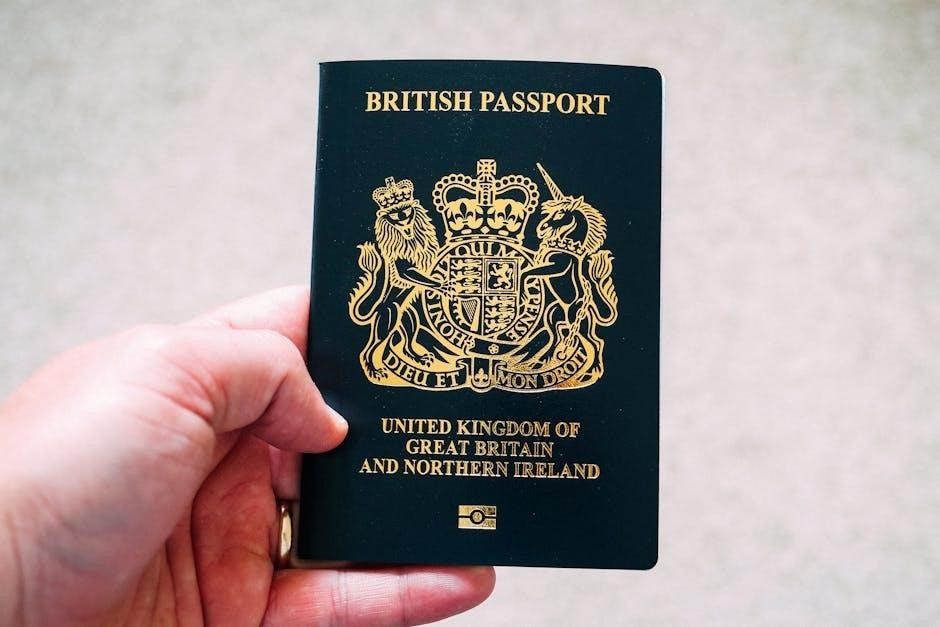Philippine dual citizenship allows individuals to hold both Filipino and foreign citizenships, providing voting rights, property ownership, and cultural ties while offering opportunities in the Philippines.
1.1 Overview of Dual Citizenship
Dual citizenship under Republic Act 9225 allows natural-born Filipinos who became naturalized citizens of another country to retain Philippine citizenship. It grants voting rights, property ownership, and cultural ties while offering opportunities in the Philippines. Filipinos in the UK can benefit from this status, which is recognized by both countries, fostering civic engagement and economic opportunities.
1.2 Importance of Dual Citizenship for Filipinos in the UK
Dual citizenship is crucial for Filipinos in the UK as it allows them to retain their cultural identity while enjoying the privileges of British nationality. It grants voting rights, property ownership, and employment opportunities in the Philippines. Additionally, it fosters stronger ties to their homeland and provides a sense of belonging to both nations, enhancing their civic and economic engagement.

Eligibility Criteria for Philippine Dual Citizenship
Eligibility includes natural-born Filipinos who acquired foreign citizenship, former Filipinos naturalized elsewhere, and children of Filipino parents born abroad, under Republic Act 9225.
2.1 Natural-Born Filipinos
Natural-born Filipinos are individuals born on or after January 17, 1973, with at least one Filipino parent at birth. Those born earlier may qualify if their father was Filipino or their mother was Filipino and they elected Philippine citizenship. They are automatically eligible for dual citizenship without needing to apply under RA 9225.
2.2 Former Natural-Born Filipinos Who Acquired Foreign Citizenship
Former natural-born Filipinos who acquired foreign citizenship are eligible for dual citizenship under RA 9225. They must file a Report of Birth with the Philippine Embassy/Consulate and schedule an appointment. Key documents include a birth certificate, foreign passport, and completed application form. Dual citizenship is granted after taking the Oath of Allegiance, restoring Philippine citizenship.
2.3 Children of Filipino Parents Born Abroad
Children born abroad to Filipino parents are eligible for dual citizenship. They must file a Report of Birth with the Philippine Embassy/Consulate. At least one parent must have been a Filipino citizen at the time of birth. The child is recognized as a Filipino citizen, retaining dual nationality, and may apply for a Philippine passport.
The Application Process for Philippine Dual Citizenship in the UK
To apply, schedule an appointment at the Philippine Embassy or Consulate, prepare the application form, and submit required documents. Ensure all steps are followed carefully for approval.
3.1 Scheduling an Appointment
Scheduling an appointment is mandatory for dual citizenship applications. Visit the Philippine Embassy’s online system to book a slot. Ensure you have all required documents ready. Applicants must be present during the appointment. Check availability in advance to avoid delays in the process. Proper documentation and preparation are essential for a smooth experience.
3.2 Preparing the Application Form
Download and complete the dual citizenship application form from the Philippine Embassy’s website. Ensure all fields are accurately filled and signed. Use DocHub for easy editing and signing. Gather all required documents before submitting. Incomplete forms may delay the process. Double-check for errors to ensure a smooth application experience.
3.3 Submitting the Application and Required Documents
Submit the completed application form, original documents, and photocopies to the Philippine Embassy in London. Ensure all documents are authenticated and meet the requirements. Pay the necessary fees and schedule an appointment for submission. Bring a valid government-issued ID for verification. Follow the embassy’s guidelines to avoid delays in processing.
Required Documents for Dual Citizenship Application
Key documents include a birth certificate, old Philippine passport, marriage certificate (if applicable), and a completed application form. Ensure all documents are authenticated and translated if necessary.
4.1 Primary Documents
The primary documents required for dual citizenship include a birth certificate, valid passport, and completed application form. For natural-born Filipinos, the birth certificate must be issued by the Philippine Statistics Authority. If born abroad, a Report of Birth is necessary. Ensure all documents are original and properly authenticated to avoid delays in processing. Additional requirements may apply based on individual circumstances.
4.2 Supporting Documents
Supporting documents include a photocopy of the Philippine passport’s data page, marriage certificate (if applicable), and divorce or death certificates (if applicable). For children, a birth certificate and parents’ marriage certificate are required. Additional documents like an affidavit of loss may be needed if the passport is lost. Ensure all documents are authentic and properly notarized or authenticated to support the application process.
4.3 Additional Requirements for Specific Cases
Additional requirements may include a Certificate of Naturalization if the applicant is naturalized in another country. For unmarried mothers, a CENOMAR or CRS form number 5 from the Philippine government may be needed. In cases where the mother was not married, extra documentation to prove Filipino parentage is required.

Where to Apply for Philippine Dual Citizenship in the UK
Applications can be made at the Philippine Embassy in London or through Consular Outreach Missions. Visit the embassy website or contact them to book an appointment.
5.1 Philippine Embassy in London
The Philippine Embassy in London is the primary venue for dual citizenship applications in the UK; Applicants must schedule an appointment online or by phone. The embassy is located at 58,098 likes 167 talking about this. Welcome to the official Facebook page of the Philippine Embassy in the United Kingdom. Dual citizenship (also known as dual nationality) is allowed in the UK. Read the rules and how to apply. revised as of 15 June 2022 PROCEDURE FOR FILING THE PHILIPPINE CITIZENSHIP RETENTION AND RE-ACQUISITION PURSUANT TO MEMORANDUM CIRCULAR NO. AFF. 05-02 REVISED… However, theres no separate application process for Philippine British dual citizenship. To become a British citizen while retaining your Filipino citizenship,…
5.2 Consular Outreach Missions
The Philippine Embassy conducts consular outreach missions in major UK cities to facilitate dual citizenship applications; These missions allow applicants to submit forms and documents in person, offering convenience for those unable to visit London. Schedule an appointment online, bring required documents, and complete the process efficiently during these outreach events.
Benefits of Acquiring Philippine Dual Citizenship
Acquiring Philippine dual citizenship offers voting rights, property ownership, and employment opportunities in the Philippines, while maintaining British citizenship, fostering cultural ties and economic advantages for Filipinos in the UK.
6.1 Voting Rights in Philippine Elections
Dual citizens can participate in Philippine elections, voting for President, Vice President, Senators, and sectoral representatives. Registration under the Overseas Absentee Voting Act of 2003 is required, enabling Filipinos worldwide to exercise their right to vote, ensuring their voices are heard in shaping the country’s future.
6.2 Ownership of Philippine Real Estate
Dual citizens have the right to acquire, own, and inherit property in the Philippines without restrictions. This benefit allows Filipinos abroad to invest in real estate, securing a tangible connection to their homeland while enjoying legal rights equivalent to resident citizens.
6.3 Employment Opportunities in the Philippines
Dual citizenship grants Filipinos the right to work in the Philippines without restrictions, offering access to employment opportunities that might otherwise be limited. It enhances job prospects locally and internationally, providing legal protections and benefits. Retaining Filipino citizenship ensures career stability, opens doors to professional growth, and facilitates integration into the Philippine job market effectively.
Rights and Responsibilities of Dual Citizens
Dual citizens enjoy voting rights, property ownership, and legal protections while maintaining obligations to obey both countries’ laws, ensuring loyalty and compliance with tax regulations.
7.1 Rights Under Philippine Law
Dual citizens retain the right to vote in Philippine elections, own real estate, and engage in business or employment opportunities within the Philippines. They also enjoy legal protections and privileges under Philippine law, maintaining strong cultural and economic ties to their homeland while living abroad.
7.2 Responsibilities as a Dual Citizen
Dual citizens must adhere to both Philippine and British laws, fulfilling obligations such as tax requirements and national service. They are expected to declare their dual status when interacting with legal or governmental entities, ensuring compliance with both nations’ regulations and maintaining transparency in their civic duties.
Legal Considerations for Dual Citizenship
Understanding legal implications, such as tax obligations, military service, and potential conflicts between Philippine and UK laws, is crucial when applying for dual citizenship.
8.1 Impact on British Citizenship
Acquiring Philippine dual citizenship does not automatically affect British citizenship, as the UK allows dual nationality. However, Filipinos must ensure compliance with UK laws and regulations regarding citizenship status. British citizens retaining Philippine citizenship should verify any implications with the UK Home Office to avoid conflicts or unintended consequences under British nationality laws.
8.2 Tax Implications
Acquiring Philippine dual citizenship may have tax implications, as dual citizens must report income to both the UK and Philippine governments. Individuals should consult tax professionals to understand obligations under both jurisdictions. The UK and Philippines have tax treaties to prevent double taxation, but specific filing requirements must be carefully followed to avoid penalties or disputes.

Retaining Philippine Citizenship
Philippine citizenship can be retained through legal procedures, allowing individuals to maintain their Filipino identity even when acquiring another nationality, ensuring continued ties to the Philippines.
9.1 Declaration of Intention to Retain Citizenship
The declaration of intention to retain Philippine citizenship is a formal process for individuals acquiring foreign nationality. It involves filing a declaration with the Philippine Embassy, affirming the intent to keep Filipino citizenship. This step is crucial for maintaining dual citizenship rights and responsibilities, ensuring legal recognition as a Filipino citizen abroad.
9.2 Oath of Allegiance
The Oath of Allegiance is a solemn pledge required for dual citizenship, affirming loyalty to the Philippines. It is typically taken during an oath-taking ceremony at the Philippine Embassy or Consulate. This step formalizes the individual’s commitment to Philippine citizenship, ensuring they uphold the country’s laws and values while maintaining their foreign nationality.

UK Laws and Policies on Dual Citizenship
The UK recognizes dual nationality, allowing British citizens to hold Philippine citizenship without requiring a separate application process, as retention of Filipino citizenship is permitted under UK law.
10.1 Recognition of Dual Nationality
The UK legally recognizes dual nationality, allowing individuals to hold both British and Philippine citizenship. This policy ensures that Filipinos in the UK can maintain cultural and legal ties to both countries without conflict, as dual citizenship is explicitly permitted under UK law and policy frameworks.
10.2 Implications for British Passport Holders
Acquiring Philippine dual citizenship does not affect British passport holders’ rights, as the UK permits dual nationality. However, dual citizens must use the appropriate passport when entering the respective country. The UK and Philippines recognize dual citizenship, allowing individuals to maintain both nationalities without conflict, provided they adhere to the laws and regulations of both nations.
Maintaining Dual Citizenship
Maintaining Philippine dual citizenship involves renewing Philippine passports and retaining citizenship through legal processes. Dual citizens must adhere to both countries’ laws and requirements to preserve their status.
11.1 Renewing Philippine Passport
Renewing a Philippine passport as a dual citizen involves submitting a completed application form, valid passport, and supporting documents. Appointments are required, and processing times vary. Dual citizens must ensure all documents are up-to-date to maintain their Philippine citizenship and travel rights effectively.
11.2 Updating Citizenship Records
Updating citizenship records ensures accuracy and validity of dual citizenship status. Dual citizens must notify the Philippine Embassy of changes like marriage, divorce, or name alterations. Submitting updated forms and supporting documents maintains legal records, preventing future complications and ensuring uninterrupted rights and benefits as a Filipino citizen.
Common Mistakes to Avoid in the Application Process
Avoid submitting incomplete forms or missing documents, as this delays processing. Ensure all information is accurate and up-to-date, and schedule appointments in advance to prevent application issues.
12.1 Incomplete or Incorrect Application Forms
One common mistake is submitting incomplete or incorrect application forms, which can delay the process. Ensure all fields are filled accurately, and avoid unsigned or undated sections. Double-check for errors before submission.
Use online platforms or guides to verify form accuracy. Incomplete personal details or incorrect information can lead to rejection, so review thoroughly to avoid rejections and processing delays.
12.2 Missing or Inadequate Documentation
Missing or inadequate documentation is a common issue that can delay the application process. Ensure all required documents, such as birth certificates, passports, and marriage certificates, are included. Photocopies must be clear, and all documents should be properly authenticated. Incomplete submissions may result in rejection or extended processing times, so thorough preparation is essential.
Acquiring Philippine dual citizenship offers numerous benefits, including voting rights, property ownership, and employment opportunities. Ensure thorough preparation and submission of documents to avoid delays and complications in the process. Dual citizenship strengthens ties to the Philippines while maintaining foreign nationality, providing a lifelong connection to heritage and culture.
13.1 Final Tips for a Smooth Application Process
Ensure all documents are complete and notarized, and schedules are adhered to. Double-check the application form for accuracy and use online tools like DocHub for efficient signing. Attend outreach missions for convenience and seek guidance from the Philippine Embassy in London or CFO for clarifications. Properly track submission and follow up to avoid delays in processing your dual citizenship application.
13.2 The Future of Dual Citizenship for Filipinos in the UK
Dual citizenship is expected to grow in popularity among Filipinos in the UK, offering enhanced cultural ties and legal benefits. The Philippine government continues to streamline processes, ensuring easier access for applicants. With increasing awareness and support, dual citizenship will remain a vital link for Filipinos abroad, fostering stronger connections to their heritage and homeland.